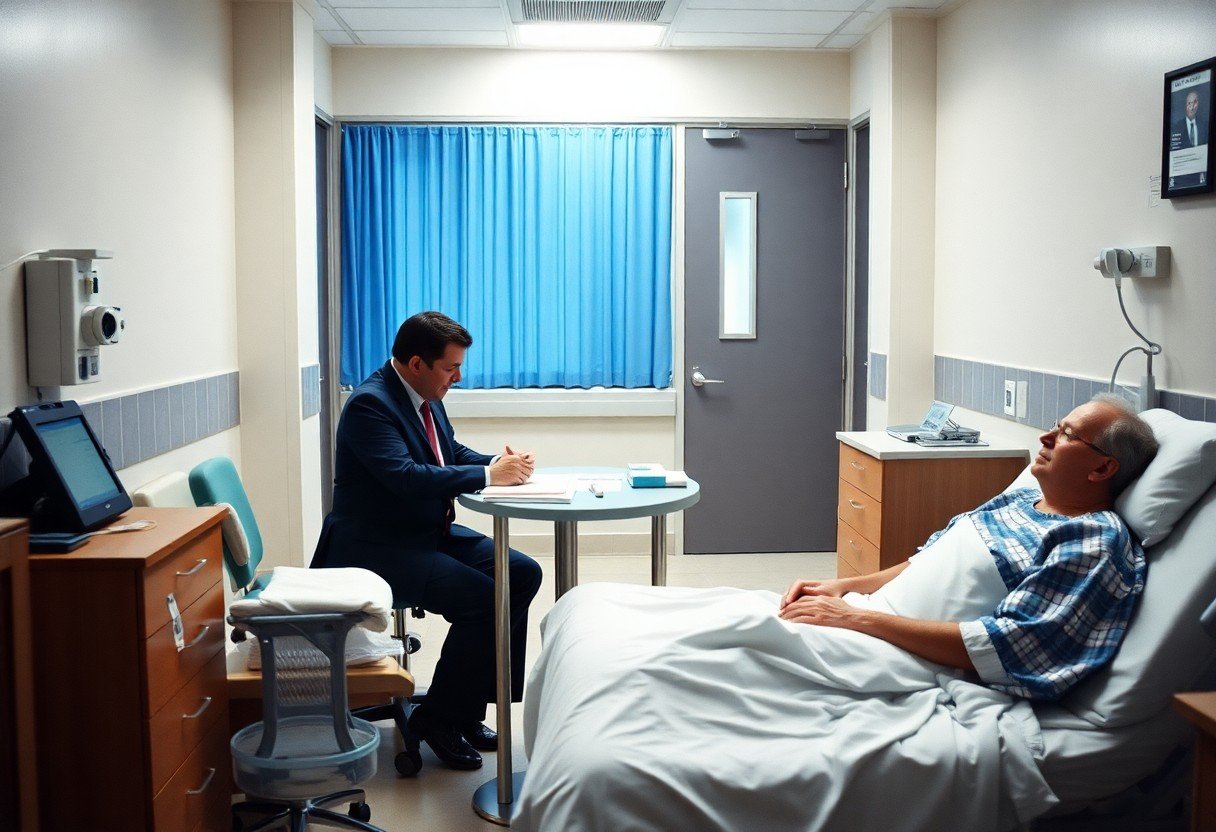Physical Address
304 North Cardinal St.
Dorchester Center, MA 02124
Physical Address
304 North Cardinal St.
Dorchester Center, MA 02124

Many people find themselves needing to get documents notarized while in a hospital or nursing home setting. Whether it’s for medical directives, power of attorney, or other important documents, you may feel unsure about how to proceed in these situations. In this guide, you will learn the steps to ensure your documents are properly notarized, including how to find a notary, what documents to prepare, and any specific considerations to keep in mind while navigating the healthcare environment.

Notarizing documents in healthcare environments poses distinct challenges due to the sensitive nature of patient care and the varying levels of accessibility. Short notice requests, the need for confidentiality, and the presence of legal representatives can complicate the typical notarization process. Healthcare settings often require notaries to adapt to unexpected circumstances, such as the patient’s condition changing or the need for medical consent forms being requested under time constraints. Navigating these nuances effectively is paramount to providing efficient service to individuals in these critical environments.
Every hospital has its internal policies that govern the notarization of documents. Familiarizing yourself with these rules before engaging with patients is important. Some hospitals may require advance notice or have designated areas where notarizations can be conducted, ensuring patient privacy and comfort. Understanding the specific protocols goes a long way in providing seamless service and reducing delays.
Nursing homes are guided by strict regulations when it comes to the notarization of documents. These protocols often emphasize patient consent, the protection of vulnerable adults, and the involvement of guardians or legal representatives when necessary. Being aware of these regulations helps you facilitate the process while ensuring that all legal protections are in place for the residents involved.
Understanding nursing home regulations involves recognizing that these facilities often have additional oversight for safeguarding the interests of their residents. Many states mandate that notarization must occur with the resident’s full understanding and consent, requiring notaries to verify their capacity to sign documents. Additionally, some nursing homes may stipulate that a witness be present during the notarization process, ensuring that the signing is free from coercion. Familiarizing yourself with these details not only ensures compliance but also demonstrates respect for the residents’ rights and dignity throughout the process.
Choosing the right notary service in a hospital or nursing home is necessary for ensuring that your documents are properly notarized. Many facilities may provide in-house notaries who are familiar with the specific needs of patients and residents. Alternatively, you may also find nearby services willing to come to the facility for notarization. Assess the availability, fees, and convenience of both options to determine which service best fits your situation.
In-house notaries often have a deep understanding of the policies and regulations specific to their facility, making them quick and efficient options. On the other hand, third-party services may offer more flexibility in scheduling and could bring additional experience from dealing with a wider range of scenarios. Evaluating the pros and cons of each will help you decide which option aligns with your needs, whether you’re dealing with a time-sensitive situation or require specialized knowledge.
Remote notary services may be ideal if you or your loved one cannot meet in-person with a notary due to health constraints or distance. Utilizing online platforms can provide the necessary legal authentication through secure video conferencing, allowing you to complete the notarization process from the comfort of your hospital or nursing home room. This option is often available around the clock and facilitates immediate access to notarial services that can cater to urgent document requirements.
In situations where distance limits your ability to access a notary, remote notary options become a practical solution. These services can be particularly beneficial for patients who require immediate notarization to fulfill legal documents such as wills, advanced directives, or financial transactions. Many states have implemented regulations supporting remote notarization, ensuring that the process is just as legally valid as traditional methods. Always confirm compliance with your specific state’s regulations before proceeding.
Before heading to the hospital or nursing home for notarization, ensure that all your documents are thoroughly prepared. Organize them neatly and avoid any alterations or scratches on the pages, as these can lead to complications during notarization. You should also verify that each document has the necessary signature spaces available, making it easier for the notary to complete their work without confusion. It’s advisable to keep backup copies as well, should any issues arise during the notarization process.
Ensure you have the correct identification and documents required for notarization. Most notaries will ask for a valid government-issued ID, such as a driver’s license or passport, alongside the documents you want to notarize. Some documents may have specific prerequisites, so researching each one before your appointment can save you time and prevent delays. Some jurisdictions may require additional forms or information, so consulting with the facility or a notary in advance is beneficial.
Witnesses are often a key component of the notarization process, especially for certain documents like wills or powers of attorney. You need to ensure that the appropriate number of witnesses is available at the time of notarization. Some states mandate one or two witnesses, while others may not require any. Make sure the witnesses are of legal age and are not related to you or have a vested interest in the document. Having witnesses can add an extra layer of authenticity to your notarization and provides additional assurance of the validity of your document.
| Step | Description |
|---|---|
| Initiating the Notarization Request | Contact the hospital or nursing home’s administration to request a notary service, specifying your needs and document type. |
| Completing the Notarization Safely and Securely | Ensure you have your ID and the documents ready. Meet the notary in a designated area where confidentiality is maintained. |
Start the process by reaching out to the hospital or nursing home administration. Explain your need for a notary, including the type of documents you require notarization for. This initial contact allows staff to prepare for your visit and potentially schedule a convenient time for you. Many facilities have notaries on staff or can help arrange for one, ensuring that your request is handled in a timely manner.
During the notarization appointment, bring your identification and the documents to be notarized. Make your way to a private area designated for such transactions. This setup helps ensure confidentiality and allows the notary to perform their responsibilities without interruption. Following these steps guarantees that your important documents are notarized professionally and securely.
The notary will verify your identity by checking your government-issued ID and ensuring that you understand the documents you’re signing. After confirming that all legal requirements are met, the notary will apply their official seal and signature, completing the process. Ensuring a quiet, private environment is advantageous for both you and the notary, as this minimizes the risk of any confusion or breaches of confidentiality during the signing. Following through with these protocols not only strengthens the legality of your documents but also provides peace of mind that everything is executed properly.

Several misconceptions surround the notarization process, particularly in the context of hospitals and nursing homes. Many believe that any hospital staff member can act as a notary, while the truth is that only certified, state-authorized notaries can provide this service. Another common oversight is assuming that notarization can happen without the necessary identification and preparedness, which can lead to delays and frustration. Understanding these pitfalls will streamline your notarization experience and ensure that your documents are processed smoothly.
You might assume that any hospital personnel can notarize documents, but only individuals who hold a valid notary public commission can perform notarizations. This distinction is important because using an unauthorized person could invalidate your notarized documents and derail any plans relying on their legitimacy.
Health conditions can significantly impact a patient’s ability to sign documents. Some individuals may have limitations due to illness, cognitive impairment, or mobility issues, requiring accommodations during the notarization process. Be prepared to adapt and ensure that the notary can work within these constraints.
For instance, if a patient is unable to physically sign, consider alternatives like a signature by mark or using electronic notarization methods if permitted by state law. Consult with a notary familiar with healthcare environments, as they can provide guidance on handling special situations, ensuring that patient rights and document integrity remain protected. Tailoring the notarization process to fit these unique circumstances can make all the difference for individuals navigating challenging health conditions.
Hence, obtaining notarized documents at a hospital or nursing home can be a streamlined process if you follow the right steps. Start by identifying a notary within the facility and ensuring that you have all required documents and identification ready. If the facility does not have a notary, consider contacting a mobile notary service for assistance. Keep in mind the special circumstances surrounding the health or mobility of yourself or your loved one, as flexibility may be necessary. Ultimately, this will help ensure that your important documents are properly executed while maintaining peace of mind.